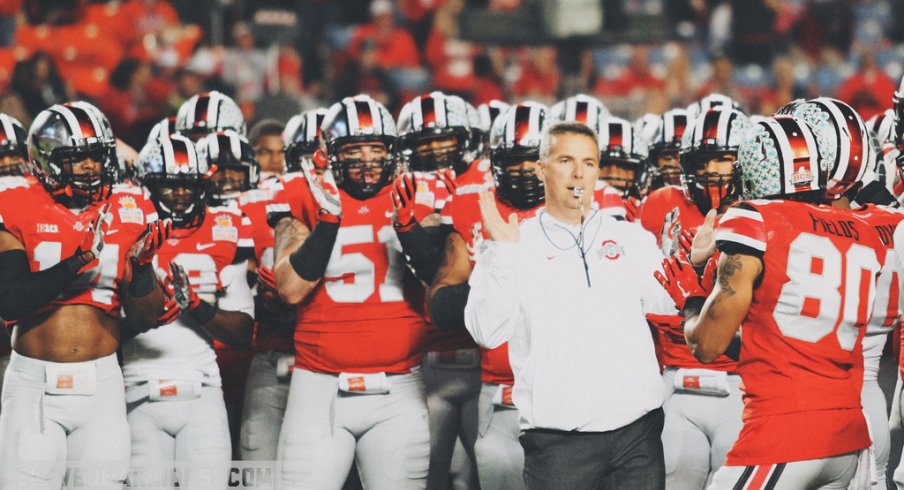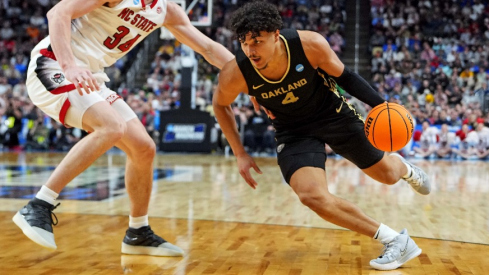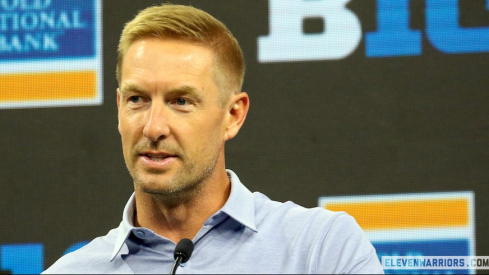Universities won't let their football players form unions for a simple reason: they think they care about their athletes too much.
Much has been written about the National Labor Relation Board's decision to designate Northwestern's scholarship football players as employees. As expected, the world is ending.
Northwestern's president emeritus prefers Northwestern no longer playing Division I sports to collective bargaining with a players union. Former Georgia coach Vince Dooley is glad he's retired so he doesn't have to deal with any issues. Clemson coach Dabo Swinney thinks professionalizing college athletics would "devalue an education," (by the way, here's a term paper a North Carolina player allegedly turned in for an A-). It's not anything new: NCAA president Karl Leib said "I predict we will have chaos in college athletics" in response to schools offering athletic scholarships all the way back in 1950.
In contrast, Ohio State's athletic figures are pragmatic. Athletic director Gene Smith supports a $3,000-$5,000 annual stipend for athletes, more than current NCAA president Mark Emmert's proposal of $2,000. Smith couldn't help but point out that the NCAA could have avoided all the lawsuits if it had the new governance structure in place four years earlier.
Archie Griffin told the Columbus Dispatch on Thursday that players deserved more, seeing how ticket prices, salaries, and expenses have skyrocketed while their compensation stayed the same. Griffin said that commercialization made Tuesday's ruling that Northwestern football players are employees of the university inevitable.
Smith and Griffin care enormously about OSU's athletes, and even those opposed to payment of players want the best for their players. Take Dabo Swinney, who favors an indeterminate stipend:
"I am 1,000 percent in favor of a stipend or modernizing the scholarships, because they haven't changed. It costs more to go to a movie, costs more to buy gas, costs more to wash your clothes than it did when I was in school. There needs to be an adjustment there. But as far as professionalizing college athletics, college athletics would go away."
It's easy for Swinney to talk about giving players a thousand dollars when he just signed a $27 million dollar contract, but he deserves the benefit of the doubt. He cares about his athletes.
Though it's hard to tell by their behavior, Northwestern cares about its athletes as well. Through this entire trial, Northwestern has said it is proud of its students for raising these issues and pursuing a solution to them. It has also thrown every lawyer it can at the case to undermine them and will do so until the bitter end, but it's reasonable to say that Northwestern wants the best for its athletes as well.
There is a two-pronged pattern to the objections above and with the few Ohio State players who have addressed unionization: 1) Nobody wants to allow college athletes to be professional. 2) Even so, everyone wants to compromise for their players' benefit. What gives?
The focus of all these objections is on money: professionalization, payment, maintaining amateurism. That's what the NCAA wants to keep the discussion about, but that's not what the players want.
The College Athletes Players Association (CAPA) is the foremost representative of players' goals. Most of CAPA's aims are directed at player safety, due process, and greater representation of players in making policy. In the face of all the rhetoric about professionalization, only one of its goals is related to payment (allowing compensation for commercial sponsorships). The other goals are about injury prevention, due process, coverage of sports-related medical injuries, and increasing athletic scholarships and GPA, all marks of wanting to stay within the current system.
The real issue is quite simple: this isn't about money, at least not for now or the next decade. It's about who controls college athletics, and the people in charge believe they know what's best for athletes better than the athletes do. Gene Smith provides a good example of the paternalism of people who want to accommodate players without giving up control:
"I'm anxious to pull some of our student-athletes in a room and say, OK, this new governance structure is in place, we're going to start talking about potential student legislation for student-athlete benefits, guys, tell me, what do you need that you're missing?”
Gene Smith and Dabo Swinney and Northwestern care about the athletes – they would just rather parcel out enough money to keep athletes happy than cede control.
The regional director of the NLRB in Chicago, Peter Sung Ohr, made it clear how much control Northwestern has over its football athletes' lives. ESPN's Lester Munson summarized Ohr's findings about Northwestern's tight control:
[Ohr] devoted more than 10 pages of his 24-page opinion to a detailed description of practice schedules, workout requirements and coaches' supervision, including approval of living arrangements, registration of automobiles, control of the use of social media (a player must be connected to a coach), dress codes, restrictions on off-campus travel and demanding study schedules. It was the kind of control, Ohr concluded, that an employer has over an employee, not the kind of control a school has over a student.
Rather than being limited to the maximum 20 "countable" hours a week players could participate in football activities, Northwestern players spent 50-60 hours a week on football. In everything but name, Northwestern players were full-time employees of the university.
Northwestern's two-facedness is typical of an organization that wants its students to be independent but still control them for their own purposes. It's a kind of self-deception that Northwestern's players weren't willing to tolerate any longer.
Unlike Northwestern, Ohio State football athletes aren't going to unionize anytime soon, but the control issues are even worse. Ohio State athletes without question spend as much time on football each week, with the additional twist that the athletic department has access to most of its athletes' bank accounts, to monitor spending.
In part, Ohio State's obsessive control is based on the university getting slammed three years ago when everyone decided tattoos and trinkets were the shame of college athletics. For Ohio State to break off its now would ruin the university's reputation... or would it?
Back in 1950, scholarships were banned under the Sanity Code. A group of seven schools, the Sinful Seven, admitted they paid scholarships and would not budge. Among them were Virginia and Maryland, two schools the NCAA absolutely could not afford to nuke. The NCAA backed down, and Virginia and Maryland are still held in high esteem. The same goes for the University of Oklahoma, which successfully sued the NCAA for wider access to TV in the 1980s. If Ohio State is afraid of being the first to give up its excessive control of its athletes, it should know that history will vindicate it eventually.
Gene Smith was right: the NCAA could have avoided the whole mess if it were willing to relinquish its obsessive control of athletes and treat them like adults. But Northwestern and everyone else cares so much for those players, they refuse to let them go. Now they're going to leave by force.


